My last piece on the Traffic Soyboys reminded me of someone I had largely forgotten about, Malcolm Gladwell. He’s the frizzy haired pro-war mulatto antifa race denialist who is most famous for claiming that it took just 10,000 hours to “master” something, no inborn talent necessary. To give you a taste of what we’re dealing with, here are some of his “25 most inspiring quotes,” according to audible blog. Just skim through it and let it wash over you.
1. “Emotion is contagious.” — Malcolm Gladwell, The Tipping Point
2. “A book, I was taught long ago in English class, is a living and breathing document that grows richer with each new reading.” — Malcolm Gladwell, The Tipping Point
3. “Look at the world around you. It may seem like an immovable, implacable place. It is not. With the slightest push—in just the right place—it can be tipped.” — Malcolm Gladwell, The Tipping Point
4. “We have, in short, somehow become convinced that we need to tackle the whole problem, all at once. But the truth is that we don’t. We only need to find the sticky Tipping Points.” — Malcolm Gladwell, The Tipping Point
7. “We have a default to truth: our operating assumption is that the people we are dealing with are honest.”— Malcolm Gladwell, Talking to Strangers
8. “Defaulting to truth is a problem. It lets spies and con artists roam free.” — Malcolm Gladwell, Talking to Strangers
8. “In the act of tearing something apart, you lose its meaning.” — Malcolm Gladwell, Blink
19. “There can be as much value in the blink of an eye as in months of rational analysis.” — Malcolm Gladwell, Blink

“What is this, the left-wing Jordan Peterson?”
I remember Malcolm Gladwell most clearly for getting totally annihilated by Steve Sailer, the father of what we would call the alt-right, over a choice sample of Gladwell’s most obnoxiously superficial takes. As one example, Malcolm Gladwell had something extremely “insightful” to say about the NFL quaterback scouting process.
With the advent of the spread, though, the correspondence between the two levels of play had broken down almost entirely. N.F.L. teams don’t run the spread. They can’t. The defenders in the pros are so much faster than their college counterparts that they would shoot through those big gaps in the offensive line and flatten the quarterback.

Just like with the traffic antifas I have to stop long before I get to the main course, because he is already aggravatingly incorrect. The Spread Offense is named as such because the idea is to put more wide receivers on the field, it has little to nothing to do with blocking. In football, you are allowed to have 5 eligible receivers, but NFL style offenses tended to, back in 2009 when Gladwell wrote this piece, put heavier personnel out on the field, whether that be fullbacks or tight ends.
This has nothing to do with the blocking done by the offensive line. There are plenty of five man protection schemes in the NFL, and were back then. NFL defenders do not magically “shoot through the gaps,” in the exact same protection schemes because there are four wide receivers on the field. And NFL teams have generally gone to more and more receivers since he wrote that column anyway, so I guess putting more wide receivers on the field doesn’t magically make your offensive linemen not block as well, even at the NFL level.
Ultimately what he said was nonsensical. It’d be like saying that in hockey, you can’t get away with slapshots at the NHL level, because the forwards take short shifts and pass the puck well. This isn’t even the point of this piece, but anytime you look at Gladwell’s work on a subject you’re halfway familiar with you’ll find all these little asides that are bizarrely counterfactual.
We’re used to dealing with prediction problems by going back and looking for better predictors. We now realize that being a good doctor requires the ability to communicate, listen, and empathize—and so there is increasing pressure on medical schools to pay attention to interpersonal skills as well as to test scores. We can have better physicians if we’re just smarter about how we choose medical-school students.
But no one is saying that [college football scout] Dan Shonka is somehow missing some key ingredient in his analysis; that if he were only more perceptive he could predict [then college QB] Chase Daniel’s career trajectory. The problem with picking quarterbacks is that Chase Daniel’s performance can’t be predicted. The job he’s being groomed for is so particular and specialized that there is no way to know who will succeed at it and who won’t. In fact, [academics]Berri and Simmons found no connection between where a quarterback was taken in the draft—that is, how highly he was rated on the basis of his college performance—and how well he played in the pros.

I can’t possibly give you the full Malcolm Gladwell Experience, because one of the ways he would sneak in these insane claims was by lulling the audience to sleep with thousands of words of bloviation. He’d start out with some dumb narrative, then transition to a real life example, then throw in some misleading statistics, get back to the narrative, and repeat the process for a few thousand words in the hope that you never take a step back and a hard look at what he just said. Because what he just said was:
Berri and Simmons found no connection between where a quarterback was taken in the draft—that is, how highly he was rated on the basis of his college performance—and how well he played in the pros.

No connection. Not “less connection than people might have suspected,” literally zero. It doesn’t matter where you draft a quarterback, apparently, because the ones drafted in the seventh round are just as good as the ones drafted first overall. Does this make any sense to you?
Gladwell throws this out there like it’s not a big deal. It’s just another example of him and his audience being smarter than the people in a certain field. Except, this is one of the strongest claims of catastrophic failure and idiocy that I have ever heard of. Gladwell should win a Pulitzer Prize for journalism, because NFL teams all thinking that drafting QBs is a good thing and being wrong is one of the biggest stories ever. Or would be if this had any basis in reality.
It sounds absurd to put an athlete on the cover of a magazine for no particular reason. But perhaps that’s just the quarterback problem taken to an extreme. If college performance doesn’t tell us anything, why shouldn’t we value someone who hasn’t had the chance to play as highly as someone who plays as well as anyone in the land?
Gladwell points out one college QBs being a backup before going on to have very mediocre success in the NFL as proof that the backup college QBs are just as good as the starters, once again proving that you have no way of evaluating them for the pros. Gladwell then uses the term “the quarterback problem,” for times when you have literally no way of knowing how well someone will do in a certain field based on past performance.
Perhaps no profession has taken the implications of the quarterback problem more seriously than the financial-advice field, and the experience of financial advisers is a useful guide to what could happen in teaching as well.
Is this solution to teaching’s quarterback problem politically possible?
Before later reiterating that no, you didn’t misread him, he literally thinks it’s impossible to predict how well a QB will do in the NFL.
It was tempting to see Daniel’s [interception] as definitive. The spread had broken down. He was finally under pressure. This was what it would be like to be an N.F.L. quarterback, wasn’t it? But there is nothing like being an N.F.L. quarterback except being an N.F.L. quarterback.
A prediction, in a field where prediction is not possible, is no more than a prejudice. Maybe that interception means that Daniel won’t be a good professional quarterback, or maybe he made a mistake that he’ll learn from. “In a great big piece of pie,” Shonka said, “that was just a little slice.”
Malcolm Gladwell and the (((New Yorker))) crowd are extremely intelligent. You see, they know that there is nothing like being an NFL quarterback, nothing. The conventional wisdom is that there is one thing thing that’s very much like being an NFL quarterback, called “being a college quarterback.” But this is wrong because one study says otherwise.

Does this study “prove” that there is no correlation between how good hockey players are in junior versus the NHL? If not, why not? Why should this only be true for football?

I haven’t been keeping up with the NHL for the past few years, so I went and looked up “best players in the NHL,” and found this article. It shows a picture of Connor McDavid, the 1st overall pick in 2015, Auston Matthews, the 1st overall pick in 2016, and Cale Makar, the 4th overall pick in 2017. But according to them Cale Makar was only the fourth best player. Their third best player was Nathan MacKinnon, the 1st overall pick in 2013. Boy, it sure seems like drafting early is a good way to get better players in hockey, why not in the NFL?
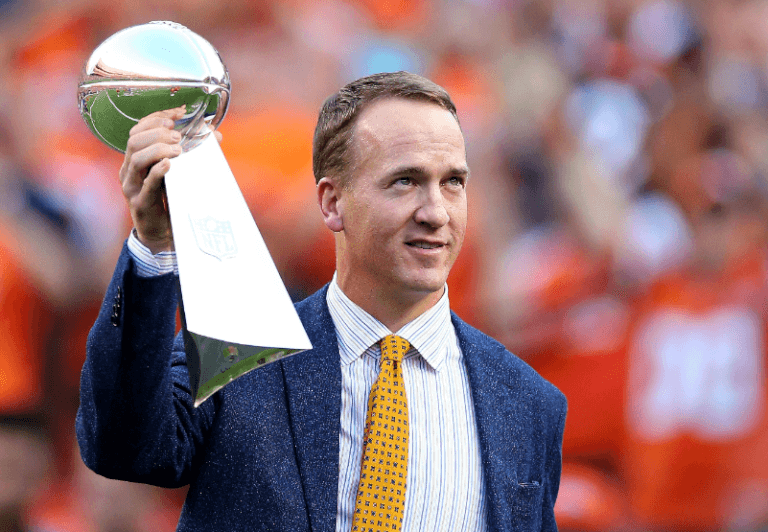
Peyton Manning and his forehead, 1st overall pick
Elsewhere in the article Gladwell admits that teams can scout and draft non-quarterbacks, it’s just different with quarterbacks because of entirely subjective reasons that require thousands of words of bloviation to espouse. I guess there’s nothing like being an NFL quarterback except being an NFL quarterback, but there’s something like being an NFL receiver called “being a college receiver”.
But if the quarterbacks drafted in the seventh round are just as good as the ones drafted in the first round, what about the undrafted quarterbacks? There are about a hundred draft eligible quarterbacks every year in college, why not just never draft a QB, and invite the most promising dozen of them to your training camp?
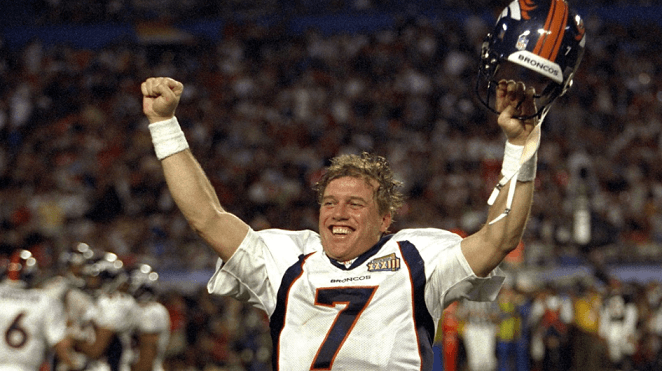
John Elway, 1st overall.
Oh, hold on a second, did I just say the most promising dozen? But how could we know which ones are the most promising if there’s literally zero way to know which ones will be better as NFL quarterbacks? After all, the backup QBs are just as good as the starters, on average. We know this because one guy was a backup QB in college and went on to play a few seasons as a backup QB in the NFL. I guess we have to invite them all!

Matt Stafford, 1st overall.
And why stop there? If the undrafted quarterbacks are just as good, on average, as the first overall quarterbacks, why not just get random people in there for training camp. Remember, there’s literally no way to know how someone will do in the NFL, so you don’t need to have ever played the position before. You don’t need to be the right age. You don’t need to be a man.

Here’s Miku Yiamoto, an 81 year old Japanese woman who speaks no English and needs a stroller. You might think that she wouldn’t be a good fit to replace Aaron Rodgers as QB of the Packers. You might think that she’d be lucky to survive in the NFL, literally. You might think that, but you’d be wrong. Or at least, you’d be presumptuous.
You see, there is literally no way to know who can make it in the NFL. We can’t know if she’s going to succeed or fail unless we try her out there.
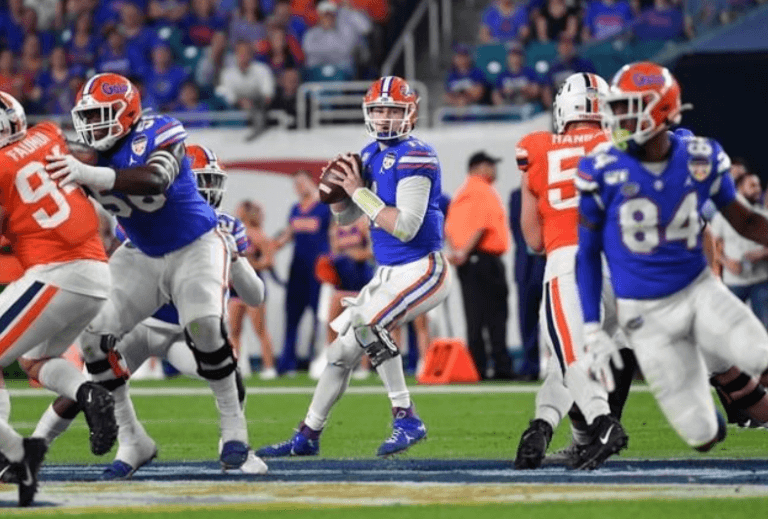
Why must we use quarterbacks that conform to the traditional ableist regime? There’s literally no way of knowing how well a wheelchair bound grandmother with Alzheimer’s is going to do out there. The only thing that prepares you for being an NFL QB, is being an NFL QB.

Now that’s what I call a pocket passer!
Imagine wasting a pick on Peyton Manning when you could get her in the later rounds. After all, there’s no way of knowing who will succeed at the NFL level. So why not someone who is currently in a coma?
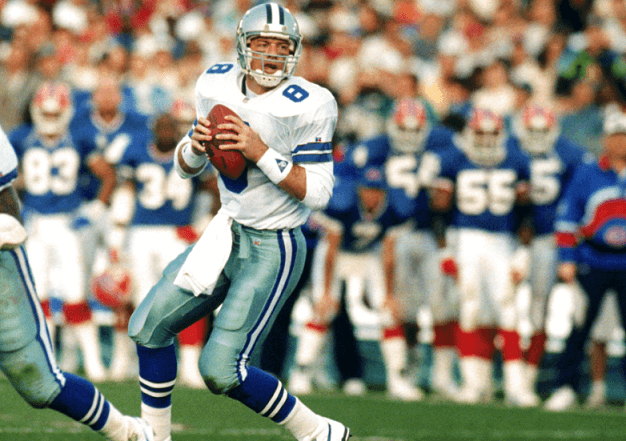
Troy Aikman, 1st overall.
How could Malcolm Gladwell say something this stupid? Well because StUDy SaYS. You might be thinking that no studies have bothered proving that first round QBs are better than random old ladies from off the street, because it’s so obviously true. This is very typical of you dumb dumb anti-intellectuals, who are too stupid to mindlessly regurgitate everything that comes out of academia as if it were the objective truth. There’s no such thing as methodological flaws, so if one study shows that seventh round QBs are just as good as first round QBs, that’s the truth, moron.
Speaking of, let’s take a look at that study.
The reverse order college draft gives the worst teams in the National Football League (NFL) the opportunity to hire the best amateur talent. For it to work effectively, teams must be able to identify the “best” talent. Our study of NFL quarterbacks highlights problems with the draft process. We find only a weak correlation between teams’ evaluations on draft day and subsequent quarterback performance in the NFL. Moreover, many of the factors that enhance a quarterback’s draft position are unrelated to future NFL performance. Our analysis highlights the difficulties in evaluating workers in the uncertain environment of professional sports.
A weak correlation, not “no correlation.” In other words, first round quarterbacks are better than seventh round quarterbacks. They’re just not as much better as people would expect.

Except the study doesn’t even show that, because it had a flawed methodology where they looked at quarterbacks who are playing in the NFL as opposed to quarterbacks who were drafted to the NFL.
NOTE: Sorry if the formatting got weird for this next bit. Nothing I could do.
And if you read the academic study Malcolm cited, the obvious methodological flaw is that the authors measure late draft pick quarterbacks who made an impact in the NFL, such as Tom Brady, and thus should have been drafted higher, but not late draft pick QBs who turned out in training camp and the taxi squad to be as mediocre or even worse than expected and never got to play.
To explain, if some undrafted quarterback gets invited to camp, sucks, and gets cut, that’s expected and we never hear about him again. If a first round quarterback turns out to suck, they probably still get to play a few seasons while the team hopes for the best. There is therefore systemic bias in favour of the statlines of the seventh round picks as a group – or undrafted QBs – because the ones who get on the field are not representative of their group, since a lower percentage of them will ever play, presumably the best ones.
Even with this flawed methodology, the study shows that the higher a QB is drafted, the better they perform, statistically. Despite the handicap of Jamarcus Russel and other busts weighing them down, the first round QBs who play are still, as a group, slightly superior to the late round QBs. Meaning that without a flawed methodology we would find that they are greatly superior to the QBs drafted after them, which is exactly what the dumb dumb conventional wisdom would have told you. That’s why if you look at starting QBs for NFL teams you’ll find a ton of first round picks, and very few undrafted guys.
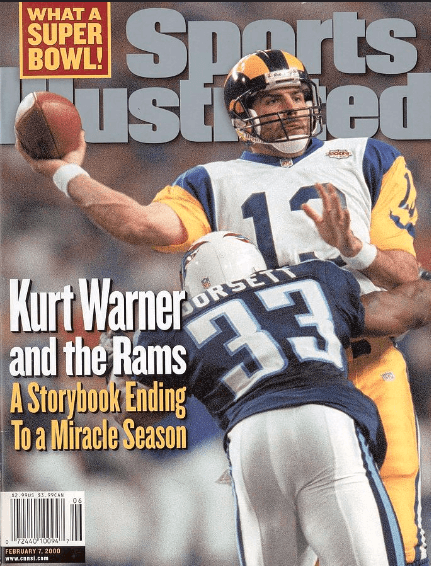
It’s a storybook, because undrafted QBs aren’t supposed to be hall of famers.
Gladwell’s claim was absurd. He blithely argued that every single person in the NFL is just an idiot – unlike him and the New Yorker crowd – who are too dumb to understand that ACaDeMIcS have “proven” that QBs in the seventh round are just as good as the ones in the first round, because one single study with horrendously flawed methodology shows that… there is still a positive correlation between QB draft position and statistical performance.
If he was actually intelligent he would have shown the systemic “failure” of NFL teams is to overplay highly drafted players for a variety of reasons. If a GM drafts a bust, he’ll try to keep playing him to make his pick look good. But even then there are legitimate reasons to give highly drafted players more chances. What they showed you in college – which lead to their high draft positions – is predictive of their future performance.
That’s why the Colts didn’t cut Hall of Famer Peyton Manning when he threw 28 interceptions in his rookie year. Although some first round QBs get way too many chances, since the systemic bias towards playing them is somewhat political, and somewhat justified.
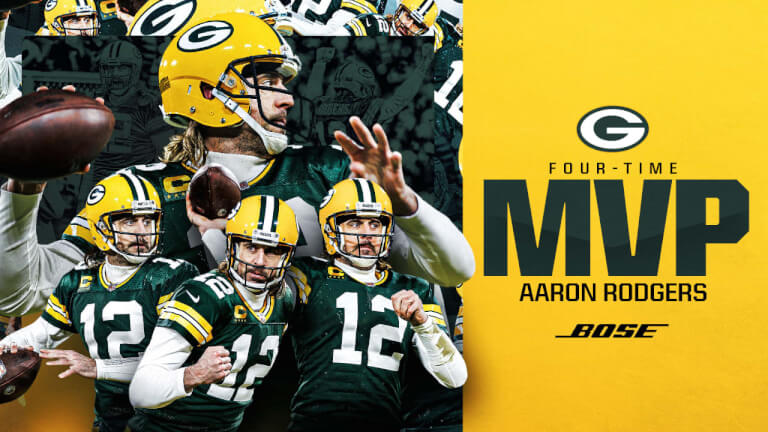
24th overall pick, 1st round.
While it’s not true that every sportsfan can articulate this systemic bias in playing time towards highly drafted players, they all instinctively know this. But Gladwell confidently writes that there is no way to predict QB performance in the NFL, then sips his martini and enjoys being intellectually superior to all of us sheeple who follow the conventional wisdom.
Most of his audience enjoys being smugly superior to us as well, but not all. A certain portion who actually watch football nod along until they pause and think about what he said for a half second. Their response was more like:

But they’d brush Gladwell’s trite, saccharine, and frankly idiotic analysis as a one-off and get back to enjoying him. After all, he’s so insightful on other issues…
Similarly, Malcolm argued that the way for less talented teams to win in basketball is to full court press. But it’s easy to come up with theoretical and empirical evidence that it works the opposite way: that full court pressing is best for athletically superior teams who are best off contesting every foot of every defensive possession to reduce the chance of a fluke hot-shooting nights by an on-average inferior opponent.
But there weren’t a lot of academic studies debunking Malcolm’s full-court-press theory, because it was so obviously wrong that it would be hard to see much point in writing up a debunking before Malcolm got involved.

I’ll spare you most of Gladwell’s bloviation about the full court press in basketball. He tells a tale of a bunch of random eight year old girls who triumphed over all the other children by employing the “weapon of the underdogs,” known as the full court press. This worked really well against the other children, but it would be too much even for Gladwell to make broad proclamations on basketball strategy based on one little girls team.
So Gladwell then looked at one single additional basketball program, the plucky underdog Kentucky Wildcat NCAA teams of the 1990’s. They used the full court press to win two national championships. These two examples cement Gladwell’s smug mind that the full court press is a weapon that underdogs can use to win against “overdogs,” and only he is smart enough to have figured this one out.
The Moderate Voice (from 2009):
There has been quite a backlash against the story by Malcolm Gladwell that I praised on Thursday.
Perhaps the real lesson is this one: Woe unto him who cites Malcolm Gladwell as an authority on any subject without some serious fact-checking first.
Most of it has focused on Gladwell’s profound misunderstanding of basketball and reckless generalization about basketball strategy based on the example of one junior girls team.
Steve Sailer did a great takedown of this way back in the day and I won’t bother repeating it, except to point out that those Kentucky Wildcat teams regularly sent all five starters to the NBA for long, all star careers. Turns out their real secret weapon was called “recruiting all the best high school talent,” and not having an overly aggressive forecheck. And it turns out that the little girls were taking advantage of some sports just fundamentally not working when the children are too young or the skill level is otherwise too low for various reasons.
Sailer gives a good example of the latter with kids baseball. Sometimes the best strategy is to never swing, because the kid throwing the ball simply cannot throw strikes to save their life. They then load the bases with walks, and you get the max five runs allowed.
Even for adults, I recently found that I couldn’t really play volleyball at the beach, because our respective teams weren’t good enough to consistently hit the ball over the net. As a result, whoever served generally racked up a huge number of points until they hit it out of bounds, or the miraculous return came. Generalizing sports strategy by looking at very low skill levels is kind of a dumb thing to do. So dumb that only Malcolm Gladwell does it.
The full court press is similar to a hyper-aggressive forecheck in hockey. This works very well at the lower levels, since the kids handle the puck/ball so poorly. Zerg rushing the puck carrier while taking away the obvious pass is the best strategy, and steadily becomes less so as you increase in skill level and age, to the point where no NHL teams do this except when needing a score late. No NBA teams do the full court press except in similar situations, since they will just have other teams scoring easy baskets passing around them.
The one thing that can make these overly aggressive styles work is having superior players with superior coaching. If your team skates faster than the other team, and handles the puck better, you can generate more turnovers with very aggressive forechecking and pinching defenseman, knowing that your players will usually beat their players to the puck if any chipouts are attempted.
But all of this is just the dumb dumb conventional wisdom. Malcolm Gladwell knows better, because one girls basketball team was using the full court press, and stacked NCAA teams use this to bully inferior competition. Therefore it’s a dominant weapon for NBA teams to use constantly, but only if they’re “underdogs.”
He thinks this, writes it down, edits it, and it never occurs to him that he might have gotten something terribly wrong, because he’s just so much smarter than everyone else. The more he’s criticized by “experts,” the more they prove themselves to be unprogressive sheep. He once again basks in his intellectual superiority over the plebs, as do most of his fans.
But unfortunately, one group of Gladwell fans are not so enthused. These fans have just a tiny amount of knowledge about basketball. Their reaction is more along the lines of:

But then they brush Gladwell’s superficial and outright moronic analysis as a one-off and get back to enjoying him. After all, he had that genius insight that NFL teams should never draft quarterbacks because there’s literally no way of knowing which ones will be good. And don’t you know, talent doesn’t exist. You just need to practice for 10,000 hours and you’ll be a master at anything.

*sips martini smugly*
BBC:
This idea is encapsulated in a golden rule made popular by the writer Malcolm Gladwell in his book Outliers. This “10,000 hours of practice” rule is based on research by psychologist Anders Ericsson, now at Florida State University. The rule tells us, a mere 10,000 hours of dedicated practice in your particular field is sufficient to bring out the best in you. Is this true?
…
Unfortunately, the moment the 10,000-hour mark is reached is not a skills tipping point – to use another phrase popularised by Gladwell. Learning and gaining experience are gradual processes; skills evolve slowly, with practice. And there is a vast range of time periods over which different individual reach their own peak of proficiency – their concert level, you might say – in whatever field.
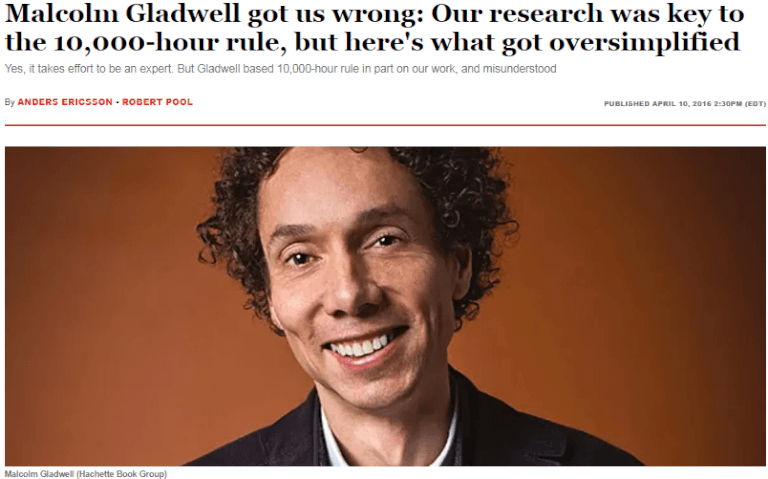
Turns out that, surprise surprise, Malcolm Gladwell’s “rule,” of 10,000 hours of practice required for mastery – whatever that means – was nonsense, because of course it was. It’s what he’s best known for, and it has no basis in reality, other than the trite observation that more practice tends to make you better. Turns out talent is real, and people improve at different rates.
It was always incredibly dumb to pretend otherwise. We know that talent is the dominant aspect for many pursuits, but pretending otherwise flattered these people’s shitty fake morality and unearned self-conception as intellectuals. You see, the poor Blax aren’t prone to crime or not graduating high school, they just don’t have muh opportunities because muh systemic HuWhyte Supremacy.

Look at these future engineers.
Conventional wisdom, ie. the low status people, think there is something innate about this, but we the smart, morally superior enlightened folx know better, because look at this one tennis player who trained for 10,000 hours and this one mathematician who did the same. They both are “masters,” so you know it’s true.
Here is another murkily connected anecdote about some Youth-American who grew up to be a doctor, and some out of context statistics. Also, haven’t you seen this study that proves this? The evidence that there’s no such thing as talent is overwhelming.

Magnus Carlsen became the number 1 rated chess player age 20. I guess he practiced more than the players twice his age…
You never hear people say this blank slate-ism garbage nowadays, because it’s known to be dumb. Since these dipshits can no longer pretend to be intelligent and morally superior by mindlessly regurgitating this, they don’t. Anyone who has any amount of life experiences could have debunked this with a little thought, but the NPC crowd ate it up.
Or at least most of them did. I would never pretend that there aren’t a huge number of teachers who are full of shit, but there are limits. Any Gladwell fans who worked in education might have been nodding along like all the rest, until they stopped to think about his “blank slate” garbage for half a second.

If you teach elementary schoolkids and are not completely delusional your response is going to be less soying out over Gladwell’s genius and more baffled confusion. It can’t possibly take 10,000 hours to “master” something, because you teach that to six year olds in half a semester. And it can’t possibly be that there’s no such thing as innate talent, because all kids learn at different rates, sometimes wildly different.
However, they appreciated how insightful Gladwell was when he told them that NFL teams are dumb dumbs for ever drafting quarterbacks…
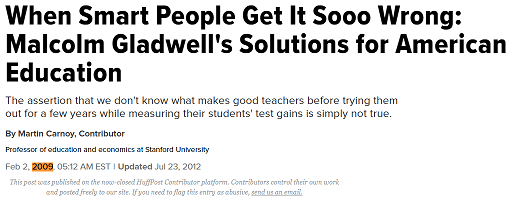
>implying Malcolm Gladwell is a smart person.
The problem is that this process repeats over and over again. Malcolm Gladwell says something extremely stupid, and the snarky midwit New Yorker crowd gobbles it up. Then the ones who have some firsthand experience with the subject think about it for half a second.

But they write off his trite, nonsensical “analysis” of education, logistics, wars, race, IQ science, biotech, you name it, as a one off mistake by the genius Malcolm Gladwell. Then they mindlessly repeat everything else he says to make people think that they’re smart and morally superior. Dontcha know that 95% of people should be let out of prisons because prison is a modern invention? The logic is impeccable.
And yes, Gladwell really said that.
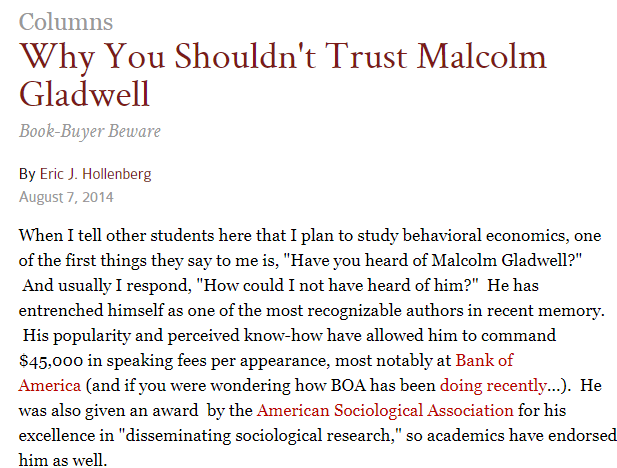
Gladwell was heavily promoted in all the right rags during the aughts. But sometime between 2010 and 2014 the mood of our bloviating Democracy Class had mostly turned against Malcolm Gladwell. He was no longer their golden mulatto, ready to make them all feel intellectually and morally superior for repeating dumb garbage.
Peter Orszag, the former head of Obama’s Office of Management and Budget, writes in his Bloomberg column:
Like many others who read Malcolm Gladwell’s book “Outliers” when it came out five years ago, I was impressed by the 10,000-hour rule of expertise. I wrote a column (for a different publication) espousing the rule, which holds that to become a world-class competitor at anything from chess to tennis to baseball, all that’s required is 10,000 hours of deliberate practice.
David Epstein has convinced me I was wrong. His thoroughly researched new book, “The Sports Gene,” pretty much demolishes the 10,000-hour rule — and much of “Outliers” along with it.
Turns out that Shaquille O’Neal wasn’t so good at basketball just because he practiced a lot, assuming he even did. But if he did, it’s probably because it was his job to play basketball and he could spend a few hours a day shooting hoops at age 37. It was his job to play basketball because he was 7’5.
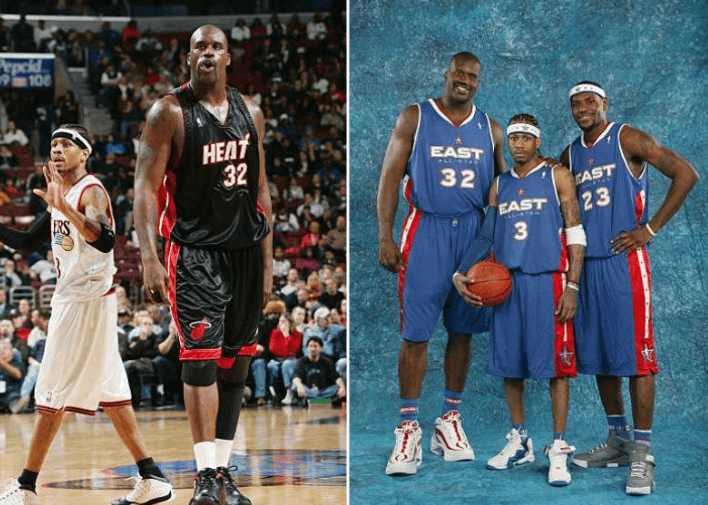
Allen Iverson is 6’0…
Even funnier, I searched “Shaquille O’Neal height,” to get that picture, and picked the first one I found. The normal sized man on the left is Allen Iverson, infamous for erupting at an interviewer after he was criticized for, you guessed it, not practicing.
If only you practiced for 10,000 hours, you too could average 30 points per night or be seven and a half feet tall. There’s no such thing as natural ability. That’s just a fascist eugenicist myth. And it’s definitely not true for intellectual pursuits.
But the concept of running reality checks on ideas, especially on ideas that seem to fit with The Narrative, just doesn’t come up much in the media, so few have learned the right lessons from the rise and decline of Gladwell’s career.
Malcolm Gladwell was a pompous, pretentious, pseudo-intellectual who weaved together cherry picked statistics with cherry picked anecdotes to tell Just-So stories about how Shaquille O’Neal is better at basketball than you because he practices more than you. Or that ultra-talented and highly recruited college basketball teams win national championships because they understand that they are underdogs. Or that Ryan Leaf, the number 2 overall pick in 1998, was a bust and therefore you should never draft a quarterback. Don’t pay any attention to the number 1 pick in that draft, Peyton Manning. That example might destroy the argument, so we’ll pretend it doesn’t exist.

I remember around 2014 reading some talking head say something insightful, less about Gladwell, and more about the fans. I can’t find the exact quote, but it was something to the effect of:
“Malcolm Gladwell seems really profound when he’s writing about a subject that you know nothing about. But when he’s writing about a subject you are familiar with his analysis seems sophomoric and simplistic to the point of being insulting. And everyone I’ve talked to has come to the same conclusion.”
The problem for Mr. Gladwell was that the NPCs eventually started comparing notes. It’s great when he blithely insults an entire field of people as dumb dumbs and gives them that unearned intellectual superiority they’ve always wanted. It’s less great when his idiotic analysis is applied to their field and they are the target of his terrible analysis. Furthermore, there’s only so many times they can hear someone else correct their regurgitations with their actual expertise before they all start to realize that the guy is full of shit. But worse, that they realize that other people realize that he’s full of shit.

You might not get that last part, but what it means is that reading Malcolm Gladwell became low-status. Shitlibs are apolitical but calculating creatures who do and repeat whatever they believe to be in their interest at all times. This is a foreign impulse for most of us, but it is what drives them. They read and repeated Gladwell to make themselves look smart. When regurgitating Gladwell was met with indifference, they did it less. When it was met with snickers, they stopped entirely. The truth never had anything to do with it, only the social incentives.

Getting back to the traffic stuff. Remember Vox, and their video where they claimed that Boston removed Interstate 93?

The vast majority of the comments on that video were positive towards them. This is analogous to those shitlibs nodding their heads and snickering with Malcolm Gladwell as they understand how silly NFL teams are for drafting quarterbacks. This isn’t even a particularly good example of their dismissive, snarky tone.
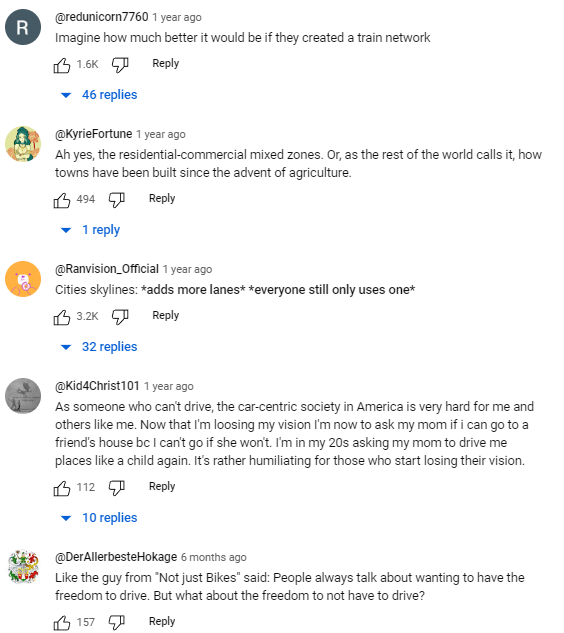
But then there were people who live in Boston.

I didn’t bother screencapping them all, but I did quote them in the piece. In short, they fact-checked Vox into admitting that the highway they drove on every day did in fact exist.
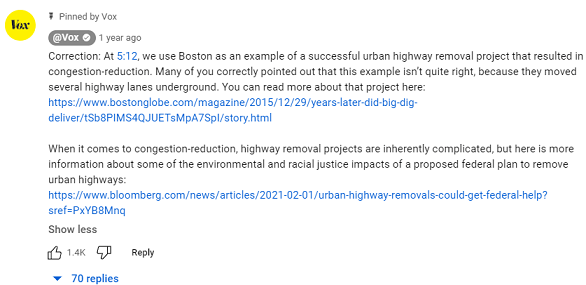
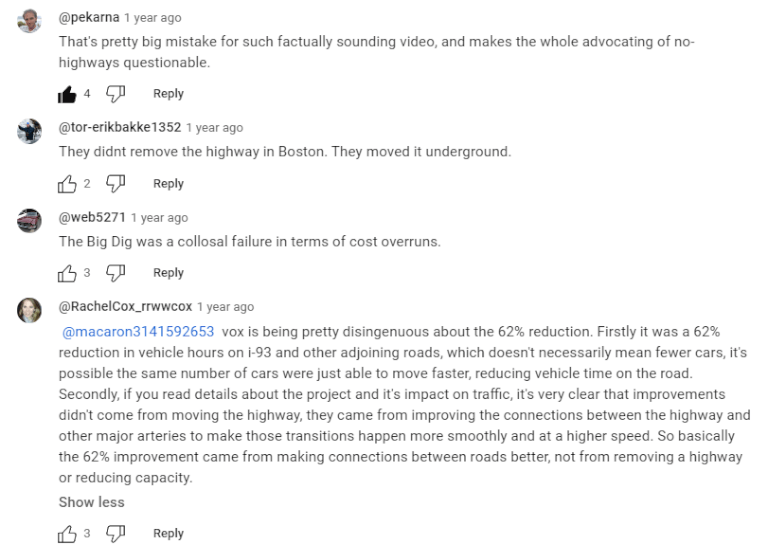 These are the shitlibs who have some experience with the specific thing that the snarky midwit thought leader, in this case Vox, is talking about. They’re nodding their heads for the first five minutes of the six minute video. Then Vox tells them that a highway that they drive on everyday doesn’t exist.
These are the shitlibs who have some experience with the specific thing that the snarky midwit thought leader, in this case Vox, is talking about. They’re nodding their heads for the first five minutes of the six minute video. Then Vox tells them that a highway that they drive on everyday doesn’t exist.

What Malcolm Gladwell said about college QBs was tremendously stupid. The reason he mostly got away with it, was that his audience took as a default, un-examined premise that they were smarter than everyone else. The product he was offering was an unearned sense of moral and intellectual superiority.
They didn’t really think about the implications, just like the urbanite fans don’t think about the implications of their “infinite induced demand,” theory, which would imply that you could build a highway a million lanes wide and it would still suffer from congestion. The product they are buying is not information, but rather a feeling of smug superiority.

By repeating this nonsense they can blather on about how the conventional wisdom is just dumb dumbs who don’t understand x. In this case x is the idea that roads get filled up to capacity when they are expanded, so we should just reduce them instead and it’ll all be fine. At other times, x will be some other superficial nonsense, like that NFL teams can get QBs that are just as good in the seventh round, or even undrafted.
Unfortunately, the conventional wisdom is often entirely correct. Beating the conventional wisdom can be difficult, even impossible on some issue. But being a pretentious little twat who thinks that they’re smarter than everyone else only requires uncritically reading Malcolm Gladwell, or uncritically watching Vox “explain” induced demand to you. And in both cases they’re pushing narratives favoured by our parasite class, like negroes having untapped intellectual potential, or saving the planet from global warming catastrophy.

The best part is that you can often point to studies that contradict the conventional wisdom, while the defenders can do no such thing. After all, no one ever made a study showing that first round QBs are better than seventh round QBs, because they are so obviously superior that it would be a waste of time. Why bother proving what everyone already knows to be correct?
If Gladwell and that crowd wanted to actually beat the conventional wisdom, they could have spent months or even years pouring over the data and figuring out if NFL teams are allocating too many draft resources to quarterbacks. And the same was true for the pseudo-intellectual “academics” who did that methodologically flawed study that found only a small correlation. But these people aren’t in it to be factually correct. They’re just snarky midwits who want to feel intellectually superior to everyone else.

The Urbanites and Malcolm Gladwell are two sides of the same coin, and have huge audience overlap at least in terms of archetype, if not specific people. I wonder then if the audience will ever compare enough notes to realize that these people are full of shit and have nothing to offer them.

After all, how many times do you need to drive on a road that was expanded while enjoying less congestion, to realize that assumed proportionally induced demand is bullshit? How many times do you need to nod along to a video about bikeability, only to realize that no, Crime-Americans will just steal your bike?

I can’t say, but I sometimes wish I was a sociologist so I could study these people.














Let me change the topic of discussion from this genetic mutant to something of value for homo sapiens.WARNING – You will be reading this stuff for hours on end.
Bizarrely, some historians – mainly Jews or their sympathisers – seriously hold that any attempt to explain Hitler is ‘immoral’
These historians insist that Hitler must forever remain a mystery, and that history must never attempt to explain him.
Any explanation is considered, reports Rosenbaum, ‘dangerous, forbidden, a transgression of near biblical proportion’ .
Rosenbaum also suggests that historians
are unable to find any narrative into which Hitler fits, or any new theory to explain him.
“EXPLAINING HITLER” – tHE Occult History of the Third Reich – Or “godammn – we haven’t done sheet as a species since the early 1900s”
https://thirdreichocculthistory.blogspot.com/2012/11/explaining-hitler.html
Gladwell’s face, that head, that hair – physiognomy is real!
In my line of work I find that new employees take about a month to settle in, and can take as little as a single meeting to discuss things they can improve to drastically improve their performance.
It’s weird, but none of those involve 10,000 hours.
[…] PSA: Frizzy Haired Mulatto Malcolm Gladwell, Snarky Midwit Thought Leader of Days Gone By […]
AAH SHIT, Followed the link on the Elol Cow fake gamer girl video and I get jumpscared.
You win this time Rakeman!!